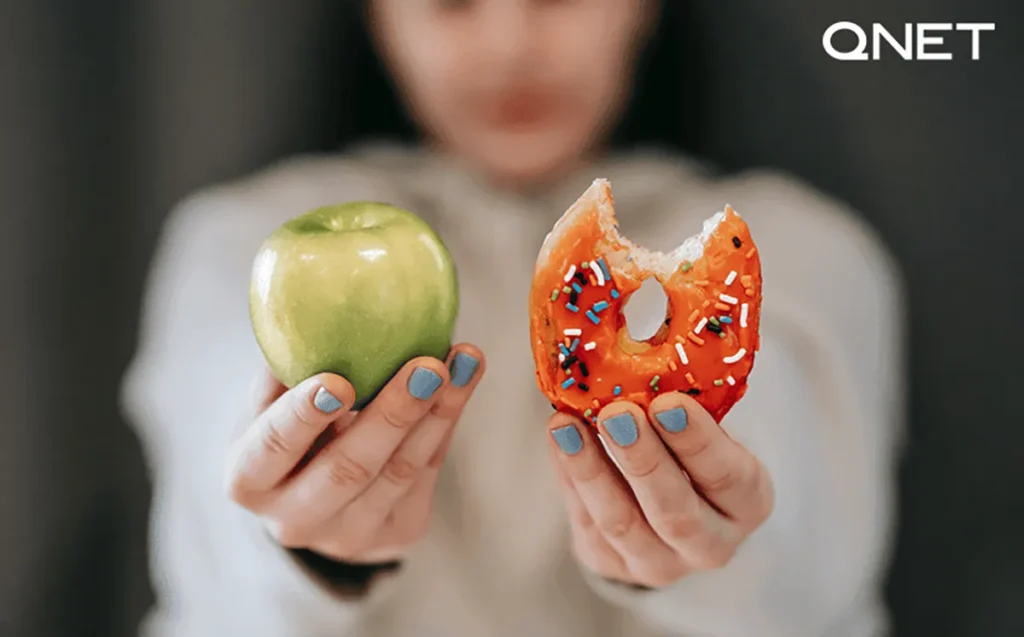Diabetes is a long-term (chronic) illness. This health complication affects how your body converts food into energy. The majority of the food you consume is converted by your body into sugar (glucose), which is then released into your bloodstream. Your pancreas releases insulin when your blood sugar levels rise. In order for blood sugar to enter your body’s cells and be used as energy, insulin functions like a key.
When you have diabetes, your body either produces insufficient insulin or uses it improperly. An alarmingly high amount of blood sugar remains in your bloodstream when there is a lack of insulin. That can eventually lead to major health issues like kidney problems, weakened eyesight, heart disease, and more.

QNET introduces you to the benefits of an active solution for managing blood sugar levels: Nutriplus DiabaHealth.
Let’s get acquainted with the nature of this chronic illness first–
Type 1, Type 2, and Gestational diabetes are the most prevalent forms of the disease.
- Type 1
Those who have type 1 diabetes cannot produce insulin in their bodies. Their immune system targets and kills the insulin-producing cells in their pancreas. Although it can develop at any age, type 1 diabetes is typically diagnosed in children and young people. To stay healthy and control their blood sugar levels, people with type 1 diabetes must take insulin every day.
- Type 2
People with type 2 diabetes have poor insulin production or usage. Type 2 diabetes can strike at any age, even in infancy. However, those in their middle years and older are most likely to develop this kind of diabetes. Type 2 diabetes is also observed to be the most common among people.
- Gestational Diabetes
Some women experience the onset of gestational diabetes during pregnancy. After the baby is born, this type of diabetes typically disappears. However, if you have gestational diabetes, your risk of getting type 2 diabetes in the future is higher. Type 2 diabetes can occasionally be detected during pregnancy.
Here are certain changes you can bring to your life and manage your blood sugar levels efficiently.
Tips to Manage Blood Sugar Levels at Home
Choose Healthy Carbs

If you have diabetes, choosing a healthy variety of carbohydrates will help you maintain stable blood sugar levels so that you can stay well-energized all day. Simple carbohydrates, in particular, can raise blood sugar levels, which over time, can result in serious consequences from diabetes. But that doesn’t imply you have to completely stop eating carbohydrates.
Increasing your intake of plant-based foods is healthy for your heart health—and this is particularly vital if you have diabetes. Legumes provide protein, carbohydrates, fibre, and iron in a delicious package.
In addition to these nutrients, yoghurt also contains vitamin D, a substance that many individuals with diabetes are advised to consume. Vegetables high in starch are excellent choices if you have diabetes.
Be Mindful of Your Salt Intake
Being careful about daily salt consumption is essential for people with diabetes. Blood sugar is unaffected by salt consumption. Limiting salt, however, may help prevent or manage heart disease and high blood pressure. People with diabetes should be concerned about these two health concerns.
Diabetics often consider using salt alternatives. However, some salt alternatives contain potassium chloride. People suffering from kidney diseases should avoid using these alternatives. Instead, condiment such as ginger and garlic can enhance the flavour of your food items when used appropriately.
You have control over the salt content of the food when you prepare it yourself. Salt levels in processed foods and restaurant food are often high.
Fruits and Vegetables are Your Best Friends

Checking foods’ values on the glycemic index (GI) is one technique for a person with diabetes to know how much carbohydrate their diet contains.
A scale from 1 to 100 is used to rate foods according to their glycemic index (GI). This score gives an indication of how soon that particular food item may elevate blood sugar levels. In general, high-GI foods are absorbed by the body more quickly when compared to medium or low-GI index foods.
People should pick a range of veggies, paying special attention to the ones they like. You can try some new cooking and serving techniques to make eating healthy food interesting. People with diabetes can maintain their health while taking pleasure in a variety of fruits and vegetables.
Don’t Avoid Healthy Fats Entirely
Fat is an important macronutrient that can aid in post-meal glucose regulation. Healthy forms of fat can maintain safe cholesterol levels. More importantly, it also plays a significant role in the management of diabetes.
Healthy fat aids in the synthesis of hormones, the adjustment of fat-soluble vitamins, and the creation of hormones. It goes without saying that adding healthy fats to a diabetes-friendly diet is vital and shouldn’t be ignored.
Avoid Added Sugar
Processed meals and beverages contain harmful levels of added sugar. This includes not just the fast food but also the sugar you use at home to sweeten your food on a regular basis. But what people are often unaware of is that added or refined sugar provides no nutritional value.
In other words, sweet desserts don’t have a lot of nutritional value. They contain a lot of sugar, which can trigger blood sugar spikes that make you feel hungry and exhausted and increase craving for sugary food items. That could be a serious concern for people who have diabetes.
Get your Vitamins and Minerals
Vitamins and minerals are essential to your body’s ability to process glucose. Because of this, it’s critical to comprehend how these micronutrients and minerals relate to diabetes and your general wellness.
There are a few categories of vitamins and minerals: macro-minerals, trace minerals, and water-soluble and fat-soluble vitamins. All these types of nutrients play a crucial role in controlling diabetes because they have anti-inflammatory and immune-modulating properties. They can aid in the immune system’s general improvement and help an individual manage diabetes.
Nutriplus DiabaHealth for Better Sugar Management

We have a great solution for optimal blood sugar management: Nutriplus DiabaHealth by QNET India. DiabaHealth is a blend of essential herbs and plant extracts that help an individual in regulating their blood sugar levels.
The combination of natural components and plant compounds in QNET Nutriplus DiabaHealth has been found to enhance the uptake of glucose into cells. Malabar Kino, a significant component of Nutriplus DiabaHealth, contains the active element “Epicatechin,” which mimics the effects of insulin naturally.
Other medicinal components called natural insulin mimetics help control blood sugar levels by acting like insulin in the body. Karela (bitter gourd), Jambul (Indian blackberry), Tejpata (bay leaf), Methi (fenugreek), Tulsi (holy basil), Neem (Indian lilac), Gurmari (cowplant), Makhamalsem (velvet bean), and Kutaki are some of the other ingredients in Nutriplus DiabaHealth.
Choose Nutriplus DiabaHealth from your QNET India eStore and enhance your body’s ability to fight against the effect of diabetes!
Also, read – How to start a Sugar-Free Diet with Nutriplus Natose by QNET India?








